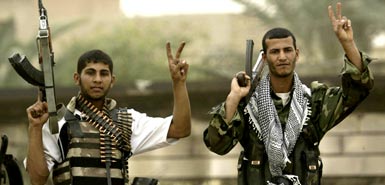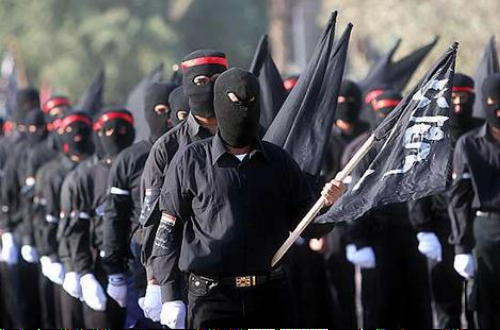Al-Maliki Vows Crackdown in Baghdad
Nouri al-Maliki is doubling down his bets, vowing a Basra-style crackdown in Baghdad.
Prime Minister Nouri al-Maliki said Thursday he planned to launch more security crackdowns like the one in Basra against “criminal gangs” in Baghdad. Addressing a news conference, he singled out Sadr City and Shula — two Mahdi Army militia strongholds in Baghdad — as likely targets in the future crackdowns, saying they were under the sway of “criminal gangs.”
Al-Maliki did not mention by name the Mahdi Army militia, which is led by radical Shiite leader Muqtada al-Sadr. Sadr City and Shula are militia strongholds and any attack by government troops there is likely to trigger a backlash by the militia like what happened in Basra last week.
Because it worked so well before?
I understand the desire to crack down on dissidents and time is certainly running out on Maliki’s ability to hold onto power. But unless this is much better planned and successful than the Basra episode, this will have precisely the opposite of its intended effect.





How many more American’s will die to keep Maliki’s pro-Iranian regime in power?
But hey, the surge rocks!
Wasn’t the surge _our_ Basra style crackdown in Baghdad? Wasn’t that supposed to have been working wonderfully?
Maliki is sounding more and more like the reality-challenged third-world dictator in Woody Allen’s “Bananas”:
“From this day on, the official language of San Marcos will be Swedish. Silence! In addition to that, all citizens will be required to change their underwear every half-hour. Underwear will be worn on the outside so we can check. Furthermore, all children under 16 years old are now… 16 years old!”
When we see him wearing military fatigues, we’ll know the game is over.
I’ll bet none of those who have posted prior to my post have ever served anything but themselves and certainly not their country. What is the President of Iraq supposed to do, let Sadr keep a private army? How many militias existed under Saddam? Let us face it, no matter what, you Fondas would be against whatever progress there may be in Iraq. Check out Riggio’s take on what happened in Basra. He was there. Speculating from this distance is just what it is. That is stupid.
I don’t understand the basis for your extreme skepticism, Dr. Joyner. I just finished reading a post by Dafydd ab Hugh at BigLizards which concludes with the following summary about the Battle for Bazra’s winners and losers:
Do you disagree with these observations? If they’re correct, isn’t their implication that the Maliki government was, overall, successful in Basra?
I don’t know where the 18% figure comes from or, indeed, if anyone knows how large the Madhi Army is. It’s news to me, too, that “The Iraqi Army now controls the territory formerly controlled by the Mahdi Militia.” I haven’t seen any other reports to that effect.
More simply, though, I define “success” in military operations by whether the initiator of hostilities achieved their political objectives. I don’t see how Maliki did that. He’s generally perceived to have weakened, not strengthened, his position.
It seems that “he’s generally perceived to have weakened…” is true in the sense that that is the narrative of the liberal American press. The NY Times, et. al. are notorious for needing instant gratification. In urban warfare that’s just not going to happen.
The stuff I am reading out of Iraq has a completely different take than the view from the Upper West Side. A unilateral cease fire due to significant losses, lack of supplies and dismal moral doesn’t look good for the Mahdi army.
James, I can’t fully agree with you that winning” is defined by whether an initiator meets their stated goals. That presumes that the initiator’s publicly stated goals are in fact their real goals. Then there is the matter of degree. If one obtain’s 70 percent of one’s stated goals has the initiator won or lost?
The perception of whether Maliki has strengthened or been weakened may be quite different in Iraq from in the US. And there has been a long history in the Middle East of one side being crushed but then declaring success because it simply survives. What I have not seen is any evidence that Sadr’s forces have more not less freedom of action or are more powerful vice the ISF.
My sense is neither side had a home run and both will declare victory. Both got chewed but Maliki has shown he can & will decide to go on the offensive when it suits him. I sense this wasn’t intended simply for Sadr alone but also to signal to both the US and Iran that he’s now more independent.